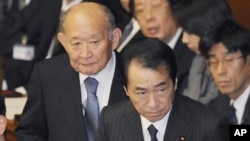Japan's prime minister calls for maintaining fiscal discipline and building market trust in the country's bonds. The remarks follow a downgrade in the country's sovereign debt rating, the latest bit of troubling news for Japan’s long-stagnant economy.
Japan’s prime minister is in damage control mode.
The Standard and Poor’s rating agency has placed Japan on the same risk level as China, reducing its credit rating one notch to AA-. The agency says it made the cut because government lacks “a coherent strategy” for reducing its debt burden.
Prime Minister Naoto Kan commented on the downgrade in an appearance before parliament on Friday.
The prime minister, while offering no new strategies, says it is important to maintain fiscal discipline and win market confidence for Japan’s fiscal management.
Mr. Kan has previously said Japan’s rising social welfare expenses and its soaring national debt make a sales tax increase inevitable.
Opposition lawmakers blasted Mr. Kan, who was previously finance minister, for his initial response Thursday to the downgrade.
The prime minister told reporters he was “not well informed” and could not immediately discuss the downgrade.
Natsuo Yamaguchi, the leader of New Komeito, the third-largest political party, spoke in parliament Friday.
Yamaguchi says he could not believe his ears when he heard the prime minister say he was ignorant about the matter. It is clear, Yamaguchi adds, that Mr. Kan lacks a sense of crisis about the country’s stagnant economy.
The influential Nikkei business newspaper warned on Friday that Mr. Kan’s government needs to demonstrate a plan for tax and social reform to avoid a disaster that could see financial markets spinning out of control.
Market analysts say such action is critical for the world’s third-largest economy. Japan has scant natural resources, and is reliant on exports to fuel its economy. It is struggling to deal with an aging population, but the government has resisted opening the door to immigration, which would replenish the labor pool, especially in service industries.
Industry leaders say the first credit ratings cut for the country in nine years should prod Japan to restructure its budget and reduce spending.
Unlike some countries that have run into serious debt trouble, 95 percent of what Japan owes is held domestically. That makes the economy less vulnerable to the whims of market speculators who have triggered serious financial crises elsewhere.
Japan’s economy has been in decline since the early 1990’s and recently has been beset by deflation. Official comments repeatedly characterize the country’s economy as “pausing.”
The government on Friday announced that while unemployment declined slightly in December, consumer prices also fell for a 22nd consecutive month.
Japan Reacts to Sovereign Rating Downgrade
- By Steve Herman











